
In an ideal world, we would meet all of our nutritional needs through a balanced, whole-food diet. But in today’s fast-paced life, where processed meals and lifestyle imbalances are common, supplements can help bridge the nutritional gap. However, they are not a substitute for healthy eating — they are a support system. Let’s explore when supplements are actually needed, how they benefit our body, and what precautions we should take before adding them to our daily routine.
Why Do People Take Supplements?
Modern life has drastically altered the way we eat and live. Long working hours, processed foods, irregular eating habits, and chronic stress all contribute to nutritional deficiencies. Here are a few common reasons people turn to supplements:
1. Nutritional Gaps in the Diet
Even those who try to eat healthy may fall short in getting enough essential nutrients. Factors like soil depletion, food processing, and cooking methods can reduce the nutrient content in food. For example, cooking vegetables at high temperatures can destroy vitamins like C and B.
2. Medical Conditions and Deficiencies
Some people suffer from medical conditions or absorption issues that prevent them from getting the nutrients they need through food alone. Common deficiencies include:
- Vitamin D (especially in those with little sun exposure)
- Iron (often seen in menstruating women)
- Vitamin B12 (common among vegans and older adults)
- Magnesium (in people with digestive disorders)
3. Dietary Choices (Vegans/Vegetarians)
Plant-based diets can be incredibly healthy, but they may lack nutrients found primarily in animal products. Vegetarians and vegans often benefit from:
- Vitamin B12
- Iron
- Omega-3 fatty acids (DHA/EPA)
- Zinc
Common Supplements & Their Health Benefits
Vitamin D
- Role: Strengthens bones, supports immune system, improves mood
- Who Needs It? People who stay indoors often, live in cloudy areas, or have darker skin tones
- Tip: Take with food that contains fat for better absorption
Omega-3 Fatty Acids (Fish Oil)
- Role: Supports heart health, brain function, reduces inflammation
- Who Needs It? People who don’t eat fatty fish like salmon or tuna
- Plant-Based Alternatives: Algae oil (vegan DHA source)
Magnesium
- Role: Helps with muscle function, sleep, nerve health, and managing stress
- Sources: Nuts, seeds, leafy greens, but supplementation helps in deficiency
- Bonus: May reduce migraines and PMS symptoms
Multivitamins
- Role: Provide a little bit of everything — vitamins, minerals, antioxidants
- Who Benefits? People with unpredictable eating patterns, pregnant women (prenatal multivitamins), elderly adults
- Note: Not a replacement for meals — just a nutritional “safety net”
Iron
- Role: Essential for making red blood cells and preventing fatigue
- Who Needs It? Women (especially during menstruation), pregnant women, and people with anemia
- Caution: Excess iron can cause constipation or stomach upset — take only with medical advice
Calcium
- Role: Maintains strong bones and teeth, supports muscle function
- Who Needs It? Postmenopausal women, older adults, lactose-intolerant individuals
Important Safety Tips: Don’t Overdo It!
Taking supplements isn’t as simple as popping a pill every day. It requires understanding and responsibility. Here’s what to remember:
1. Always Consult a Doctor
Before starting any supplement, especially if you are pregnant, breastfeeding, taking medication, or have health issues — talk to a healthcare professional. Some supplements can interact with medications or worsen existing conditions.
2. Check for Third-Party Testing
Not all supplements are created equal. Choose products that are third-party tested for purity, potency, and safety. Look for labels such as USP, NSF, or ConsumerLab.
3. More Is Not Always Better
Overdosing on vitamins — especially fat-soluble ones like A, D, E, and K — can lead to toxicity. Stick to recommended daily values unless directed otherwise by a doctor.
4. Watch for Side Effects
Supplements like iron or magnesium can cause stomach discomfort, nausea, or diarrhea. Start with small doses and monitor your body’s reaction.
Can You Get Everything from Food?
Ideally, yes. Whole foods contain not only vitamins and minerals, but also fiber, antioxidants, and other bioactive compounds that work together to support overall health. Here’s a quick tip:
- Fruits & Vegetables: Vitamin C, folate, potassium
- Whole Grains: B vitamins, fiber, magnesium
- Lean Proteins: Iron, zinc, B12
- Dairy or Fortified Alternatives: Calcium, Vitamin D
A well-balanced plate is always better than a cabinet full of pills.
Final Thoughts: Do YOU Need Supplements?
Supplements can be helpful tools — especially during certain life stages, health conditions, or dietary restrictions. But the goal should always be food first, supplements second.
Instead of guessing, get a blood test done and work with a doctor or nutritionist to create a supplement plan tailored to your body. Focus on long-term lifestyle habits like eating balanced meals, staying active, managing stress, and sleeping well — because no pill can replace healthy living.
